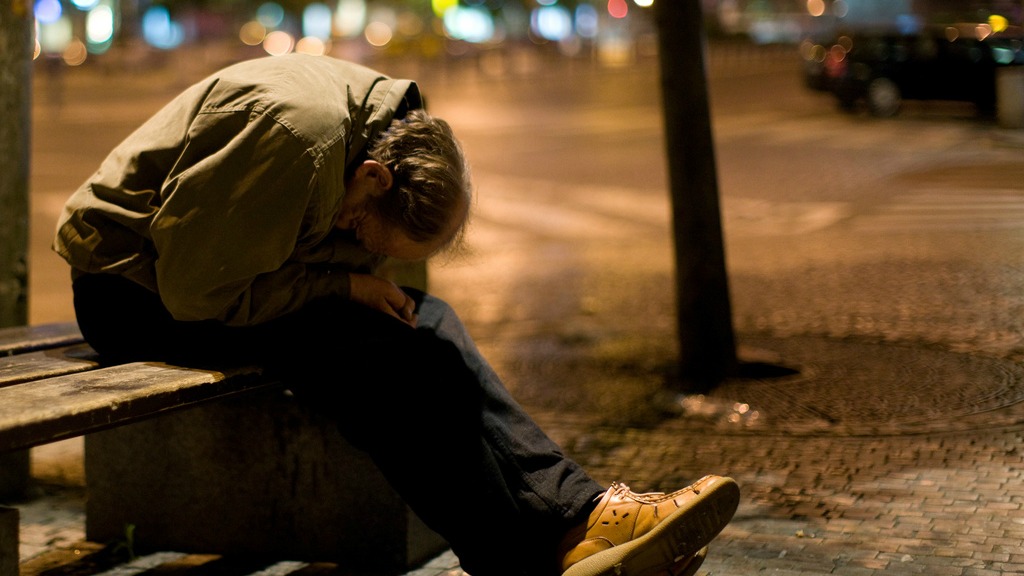Washington, D.C. isn't used to the kind of sub-freezing weather we've had this winter. I can't wait to scamper home after work, where my warm house, teenage daughters, two happy dogs, and husband are waiting for me. As I emerge from the Metro, I see a homeless, addicted woman begging at the top of the escalator. She is not wearing a coat or gloves. It is dark and sleety drizzle is coming down.
For a very long time, almost my entire adult life, I did not believe in a good God because of suffering and mental illness and torture and genocide and homeless people with frozen hands. It happens that my life has been greatly blessed – or, rather, greatly lucky. I had a good family, a good education, good health, and meaningful, valuable work to do. But I strongly believed there was no integrity to believing in God if one had my life. Who wouldn't be grateful? The real difficulty for me was the apparent absence of a loving Lord from the lives of the suffering, the despised, the raped, and the hungry. My refusal to enjoy the comfort and joy of faith was my own act of solidarity with them.
But I learned that people actually feel God's presence most tangibly when they are in the depths of suffering and loss. A Ugandan landmine survivor named Margaret made that clear when I met her in 2001 at an international conference to ban landmines. Margaret had been on a bus, returning home from work, when it was ambushed by Ugandan rebel forces of the Lord's Resistance Army (LRA). The fighters pulled women and girls off the bus and raped them. To escape, Margaret scrambled off the road into the bush. She stepped on an antipersonnel mine; it tore her leg off.
Now in my 2001 worldview, Margaret's horrendous injury – the stump of her leg was badly infected when we met and she was in incredible pain – should have been reason enough for her to curse God and go on about her business. But she didn't. When she got up on the podium to speak to several hundred activists from around the world, Margaret thanked God for her amputation. She said she experienced Jesus' presence much more after her injury, that he had blessed her daily with love and friends and had given her good work to do in helping other land mine survivors.
I was embarrassed. I was a lifelong atheist and so were most of my friends in the crowd. This woman was apparently a religious nut – who knew? But my thoughts shamed me. Margaret had something I didn't. She was powerful and gracious, and she lived a life of radiant gratitude. I didn't live a life of any gratitude, come to think. In addition to being embarrassed, I was envious.
Not being a quick study, I didn't actually believe in God until years later. But Margaret's speech was a signpost along the way. Somehow, she helped me reconcile a lousy world with a good, loving, and powerful God. Margaret herself was evidence of God's plan to heal a ruined, suppurating world. As a Christian believer, she took literally the words of the Bible that called on her to seek justice and protect the weak. This one-legged woman strides (sort of) into a world of suffering and makes it better for being there.
I am no closer to understanding the randomness of suffering today than I was when I met Margaret. I don't know why I have had wealth and opportunities that a homeless addicted woman does not. Certainly I don't deserve the life I have and neither does she. But I dimly understand that the way to live in joy and gratitude is to experience just a little of her pain and to share.
Ann Voskamp wrote in One Thousand Gifts:
Rejecting joy to stand in solidarity with the suffering doesn't rescue the suffering. The converse does. The brave who focus on all things good and all things beautiful and all things true, even in the small, who give thanks for it and discover joy even in the here and now, they are the change agents who bring fullest Light to all the world.
Now that I've got my eyes open instead of squeezed tightly shut (as they were for most of my adult life) I can see suffering much more clearly. But I can also feel joy more acutely and experience gratitude more frequently. Now I need Jesus' companionship to give me the kindness, patience, and generosity I lack so that I might share, smile, and hand over my new gloves to someone whose hands are colder than mine.
I'm not much for New Year's resolutions. They always make me want to pop open another beer. But this year I think I want to pray more often for Jesus's help to be more like him. Maybe even hourly. It does seem to me, in my limited experience of being a Christian, that those prayers are answered every time.
Holly Burkhalter is the author of Good God, Lousy World & Me and a notable human rights activist.
(Photo by liber / Flickr)









